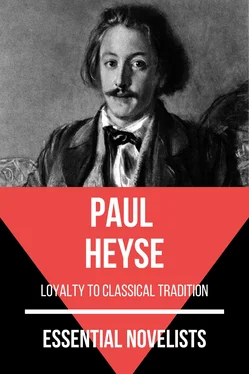"Tears?"
"Yes, Herr Doctor, you're a learned man too, I hope you will do better some day and not say like my late husband: 'first my books, and then my wife.' And yet he married me for love and not mathematics. But after two or three years, although I had not grown exactly ugly, he found those horrid triangles and hexangles, and the queer plus and minus signs, far more attractive than the blue eyes and round cheeks of his young wife. Well, I do not complain, I had foreseen it and knew what I was doing."
"But aside from this jealousy, which you share with so many women, you must have enjoyed a great deal of happiness in these rooms, or you would not have so religiously kept them in the same condition."
The widow looked at him with a searching side glance, as if she wanted to ascertain whether he was not too young to be trusted with any confidential disclosures. His honest face, and frank, open bearing, untinged by any shade of intrusiveness, seemed to please her. He was quite different from the other young literati, whom she had seen with her husband. Her quick, womanly penetration enabled her to perceive at once, that she was in the presence of one of those rare men, who are really as wise as serpents and as harmless as doves.
"You're still a young man, my dear Herr Doctor," she replied without the least sarcasm in her tone; "I don't know whether you have yet had the experience that certain natures are exceptions to the general rule, and do not pursue happiness, but become their own tormentors. Although very young when my dead husband offered me his hand, I was wise enough to know that I should not find what is called happiness with him. He who is to render another happy, must be capable of happiness himself. My poor Valentin was the most wretched self-tormentor that can be imagined, and without knowing it or wishing to do so, he tortured every one around him. I calculated upon this with mathematical certainty, as I now tell you. And yet I preferred him to all others, for he gave me a task, a constant, daily and hourly work to perform in myself, and taxed all my strength, which is very great and always longs to overcome every obstacle. Now nothing is more difficult than to conquer one's self; I was then a spoiled, petted creature, every one loved me, I coquetted with old and young, with my own heart, nay, God forgive me, with our Lord Himself. How it happened that my eyes were suddenly opened and I said to myself: 'You're a silly doll, you will ruin an immortal soul if this continues—' is too long a story. Enough, that as my heart had remained steadfast and honest, I resolved to try my fate with a very peevish or unhappy man. It will probably be no indiscretion, if I tell you that my dear old friend König was my suitor at the same time; we still joke about the fact that I was his first love. When you become better acquainted with this man, you will confess that it would be difficult to find a happier person or a more loving Christian. If I had become his wife, I should have lived in Paradise. But this was exactly what I did not desire. I felt that to be treasured all my life by such an excellent man, would finally have spoiled me. Well, with Valentin I often had more of the contrary than was agreeable; but I have never regretted it. And now sit down by me, Herr Doctor, and tell me a little about my foster child, Leah."
"I tell you, Madame? Nay, it would greatly interest me to learn from you something about the childhood and early education of my pupil, who seems to be somewhat reserved."
A sorrowful smile flitted over the lady's pleasant, cheerful face. "If I could answer that question satisfactorily, you would hardly be sitting beside me now," she replied. "But excuse me a moment, I'm wanted in the other room."
One of the seamstresses had appeared in the doorway. Frau Valentin left Edwin, and he heard her in the next room giving orders and directions in her clear, positive manner. Then she returned.
"I always have my hands full," she began. "As I unfortunately no longer have any household cares, I willingly take as much of the work of the different clubs and societies to which I belong, as others wish to discard. Ah! Doctor, it affords a great deal of pleasure to have a crowd of deaf and dumb or neglected or orphaned children thank you for their warm, new clothes; yet a single child of one's own, who need not even be deaf and dumb or neglected, or even specially grateful, would bestow a very different kind of happiness. A substitute is never the thing itself. And that's the very reason why it makes me so sad, that the only child I could love almost as my own, avoids me so strangely; she's not cold or ungrateful, but I learn nothing about the best things that may be in her nature, and cannot impart the best of mine, since she does not know how to receive them."
"Are you speaking of my pupil?"
The Frau Professorin did not answer immediately; she sat in silence gazing into vacancy, with her pretty white hands folded in her lap.
"No one has ever caused me so much trouble," she continued, "and yet she has so much amiability, goodness, unselfishness, and independence. But that's just it, the one thing needful, the one thing lacking—you're a philosopher, my dear Doctor, but I hope not one of those whose knowledge has deprived them of faith. And this strange girl—it is not the pride of superior knowledge that makes her unbelieving; no one has a more modest opinion of her own acquirements. But it's in the blood. You ought to have known her mother, whose character she has inherited, trait for trait. Nothing has ever been more mysterious to me, than how my old friend, the artist, who has such a living need of God, could be so happy with this woman, who made no secret of her want of religion, and once when I asked her the direct question, frankly acknowledged: 'that she really did not know whether there was any God at all.' She would not have denied it; but I never disclosed it, I don't know whether she made such confessions to her husband, but I almost think he would not have been puzzled by them; he loved her very dearly. And to be sure, no one could help loving her; I was unable to do so myself, long after I had given up trying to lead her to the light which has guided me through all the depths and shallows of this world. To be sure the fact that she was a Jewess, rendered it difficult for her to obtain a knowledge of the truth. But if she had only been a devout Jewess! I respect all genuine convictions. But she, on the contrary, confessed to me with the calmest possible face, that she knew no more of all the mysteries of life in her thirtieth year than she did in her tenth; she did not understand either this world or the next, and had no desire to fathom their secrets; her beautiful, bright, thoughtless present, with her husband and child, was all sufficient. I fairly started when this was first uttered so plainly. What is this miserable twilight of our earthly existence, if no ray from above warms and brightens it until we reach the full light? And besides, hers was no shallow, sensual nature; or how would she have been able to value so highly, love so fondly, her delicate high-minded husband? But perhaps it was precisely because he remained all his life as little understood by her, as she was by him, that they were so fondly attached to each other. Possibly she felt a secret longing for the peace of the children of God, and he, that desire to save which does not renounce the most darkened nature and ever seeks the lost! Besides, she was far from despising or jeering at anything others held sacred, and took it as a matter of course that her child should be educated in the religion of its father. As she herself had none, and probably sometimes felt a horror of this nothingness, she did not wish to sin against her daughter. But it was of no avail. Nature is too powerful. I fear if the daughter were asked to answer a plain question upon her conscience, she would be found to believe little more of her catechism than her mother did."
Читать дальше












